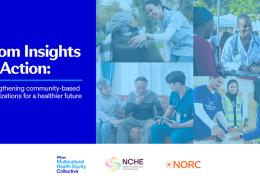Four Things to Know About Vaccination During Pregnancy

Maternal vaccines enhance the natural level of antibodies in pregnant women, which are then passed to babies in the womb to protect them against infections.
Here are four things you need to know about vaccination during pregnancy.
1. Babies are very vulnerable in the first few weeks of life
The risk of dying from infectious diseases is higher during the first few weeks of a newborn's life than at any other point. This susceptibility is primarily due to infant’s immature immune systems. Their bodies cannot mount adequate immune defenses against infections, and direct immunization is often not an option because they are so young. Consequently, infections can be fatal.(1)
2. Pregnant women can pass on lifesaving antibodies to their babies
To compensate for newborns' still-developing immune systems, nature devised a temporary defense mechanism. Starting in the second trimester, and ramped up during the third trimester, protective antibodies pass from mother to fetus through the placenta. These maternal antibodies are highest in the baby at the time of birth and then gradually decline over the next 6 to 12 months of a baby’s life. After birth, antibodies can also be passed from mother to child through breastfeeding. (2) Maternal antibodies are important for newborns to effectively fight off infections, while their own immune systems are developing.(2)
To have a significant protective effect, however, antibodies must be passed in adequate amounts to the baby. This means the higher the antibody levels are in the mom, the higher they are likely to be in babies and thus, more likely to provide protection. Pregnant women can acquire high levels of antibodies either through previous exposure to infectious agents or disease or through vaccination. Pregnant women’s immune systems can respond appropriately to the disease or vaccination because their immune systems are more mature than infants. Maternal vaccination may be the best way to ensure that pregnant women have the most antibodies available to transfer to their babies to decrease their risk of disease and death while their own immune system matures to a point that they can respond effectively.
3. Maternal immunization is steadily gaining acceptance around the world
In 2014, following rigorous evidence reviews by the World Health Organization (WHO), the benefit of maternal immunization against a number of diseases was supported by numerous studies, and it was established that vaccinating pregnant women is safe. Today, the WHO recommends the use of vaccines to immunize pregnant women to protect against several infectious diseases.(3)
The WHO further reports that, in a bid to reduce the number of infant illness and deaths due to tetanus, many countries have begun to adopt the use of maternal vaccines. At the end of 2017, maternal vaccination against tetanus had been introduced in 106 countries, and as a result, about 85 percent of newborns were protected from tetanus.(4)
In the U.S., the Centers for Disease Control and Prevention (CDC) and the American College of Obstetricians (ACOG) recommend that pregnant women in their third trimester get the Tdap vaccine to protect their babies from whooping cough (pertussis) and tetanus. Both institutions also advise that pregnant women get the flu shot, especially during influenza seasons, to protect the pregnant women and babies from flu-related complications.(5)(6)
4. Maternal vaccines are the next frontier of vaccination innovation
To reduce the global disease burden in young infants, the WHO, The U.S. Food and Drug Administration (FDA) and other regulatory agencies, along with The Bill and Melinda Gates Foundation (BMGF), have recognized the importance of developing vaccines specifically for pregnant women.
Particular focus is now being placed on developing vaccines against respiratory syncytial virus (RSV), a respiratory illness that can be devastating, particularly for infants in the first few months of life, group B streptococcus (GBS), a bacterial illness that can strike within just a few hours or days after birth and cytomegalovirus (CMV), a viral disease that can have devastating consequences to the unborn when acquired during pregnancy.
Currently, Pfizer’s Vaccine Research and Development (R&D) team is actively and passionately working on developing vaccines for RSV and GBS, among others, with the goal of addressing the global disease burden of these pathogens. Supported by the WHO and with funding from the Bill and Melinda Gates Foundation, the Advancing Maternal Immunization (AMI) collaboration is focused on identifying pathways through which the launch of RSV maternal vaccines can be facilitated, especially to prevent infant RSV disease and death in low- and middle-income countries.(7)(8)
In addition, an international consortium of scientists, funded by the BMGF and led by Dr. Kirsty Le Doare at St. Georges Hospital in London, is working to identify faster licensure pathways for a GBS vaccine, as discussed at the May 2018 meeting of the FDA’s Vaccines and Related Biological Products Advisory Committee.(9)
The successful development and introduction of new maternal vaccines have the potential to make a significant, positive, global health impact and to provide additional tools to achieve the important goal of reducing worldwide rate of infant morbidity and mortality.
Sources
(1) Maternal Vaccination as an Essential Component of Life-Course Immunization and Its Contribution to Preventive Neonatology. US National Library of Medicine National Institutes of Health
https://www.ncbi.nlm.nih.gov/pmc/articles/PMC5981886/
(2) Immunization. US National Library of Medicine National Institutes of Health
https://www.ncbi.nlm.nih.gov/pubmed/30913173
(3) World Health Organization. Safety of Immunization during Pregnancy: A review of the evidence. https://www.who.int/vaccine_safety/publications/safety_pregnancy_nov2014.pdf?ua=1
(4) World Health Organization. Immunization coverage. https://www.who.int/news-room/fact-sheets/detail/immunization-coverage
(5) Centers for Disease Control and Prevention. Why Maternal Vaccines Are Important. https://www.cdc.gov/vaccines/pregnancy/hcp-toolkit/important-maternal-vaccines.html
(6) American College of Obstetricians and Gynecologists. Immunization, Infectious Disease, and Public Health Preparedness Expert Work Group. https://www.acog.org/Clinical-Guidance-and-Publications/Committee-Opinions/Immunization-Infectious-Disease-and-Public-Health-Preparedness-Expert-Work-Group/Maternal-Immunization
(7) Pfizer. Press Release. https://www.pfizer.com/news/press-release/press-release-detail/pfizer_begins_a_phase_1_2_study_to_evaluate_respiratory_syncytial_virus_rsv_vaccine-0
(8) PATH. Press Release. https://pathwebprod.path.org/media-center/path-announces-new-collaboration-to-advance-maternal-immunization-in-low-and-middle-income-countries/
(9) U.S. Food and Drug Administration. FDA Briefing Document: Vaccines and Related Biological Products Advisory Committee Meeting, May 17, 2018. https://www.fda.gov/media/113260/download
![]()





